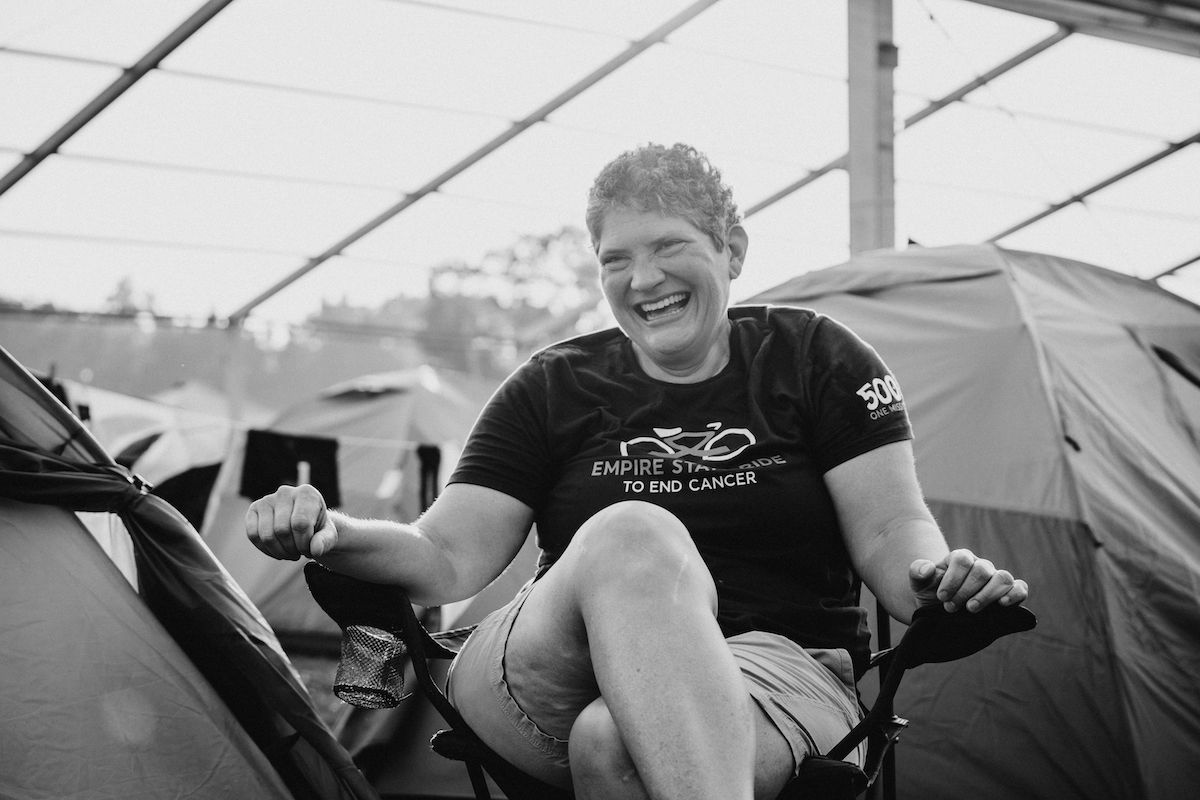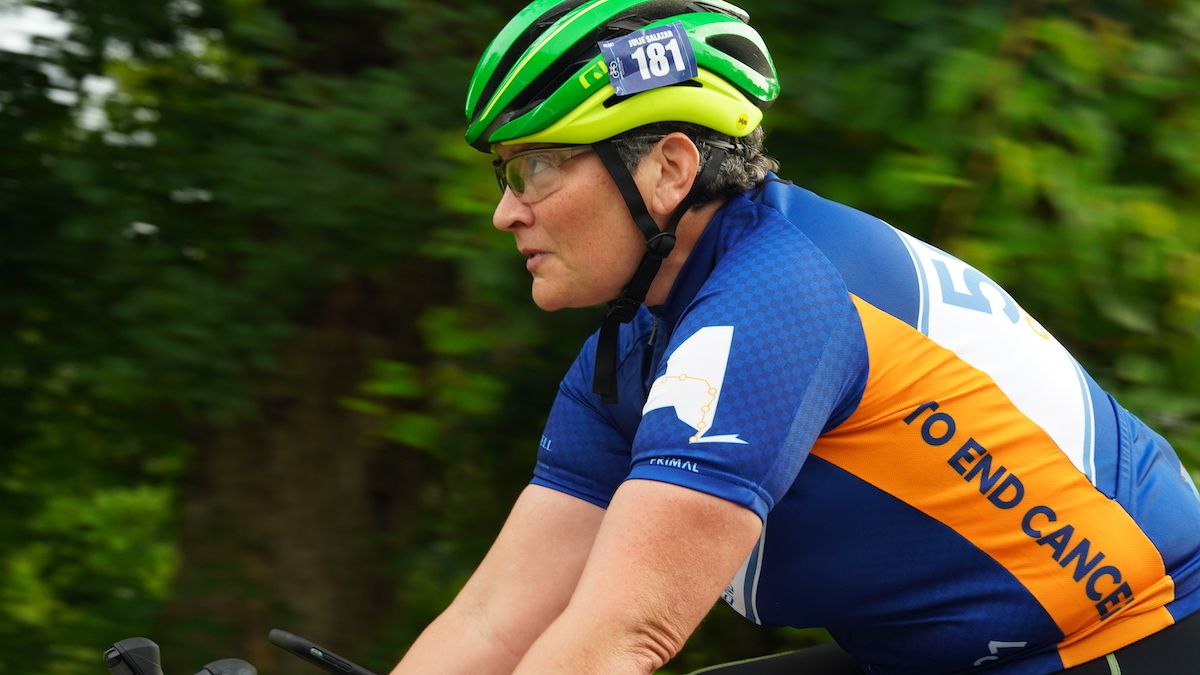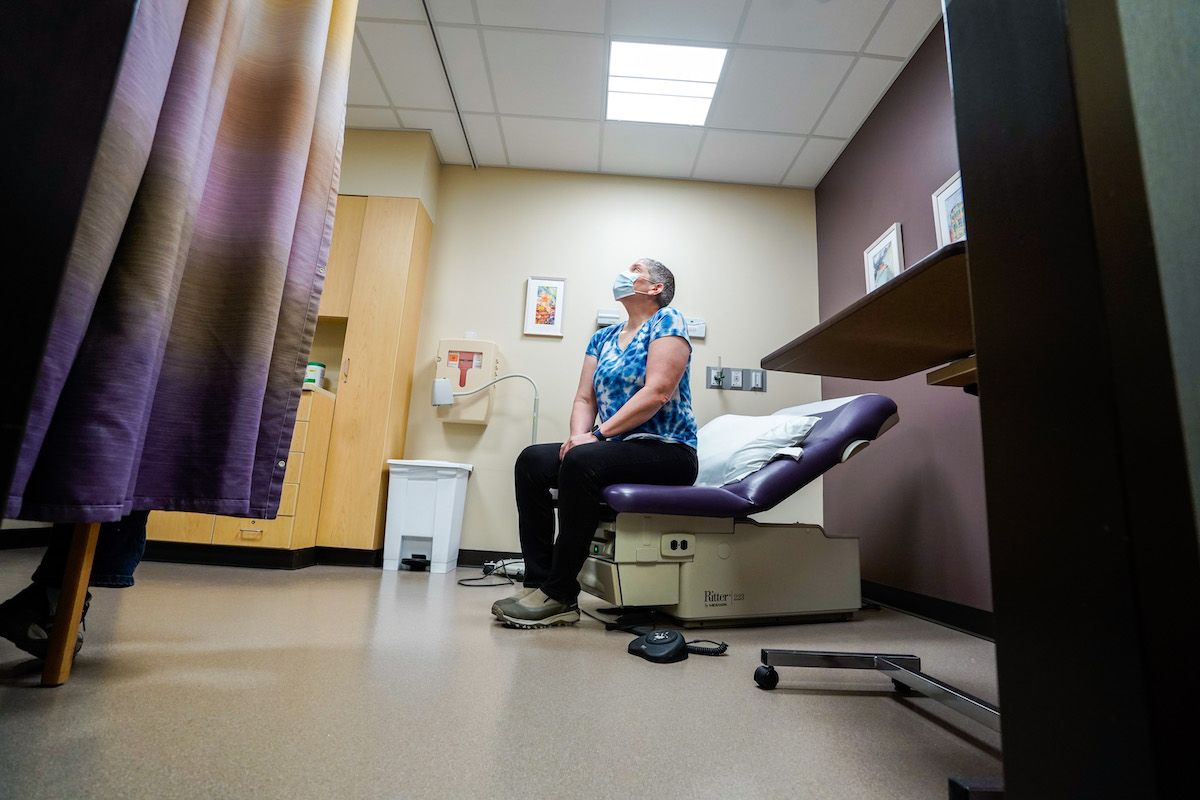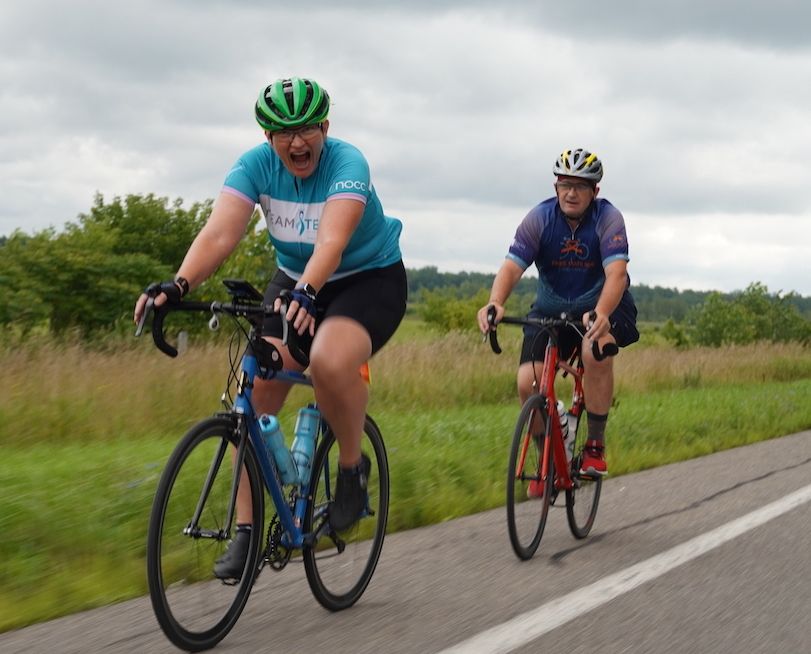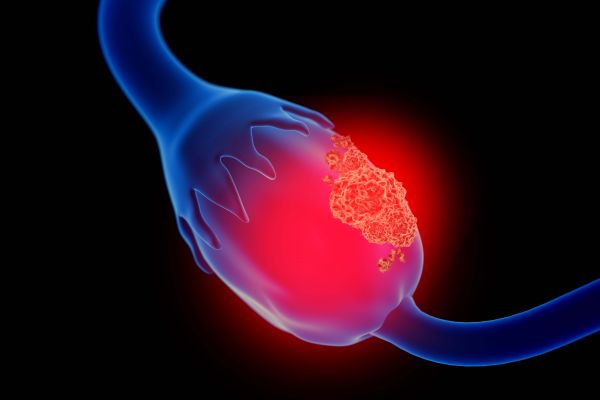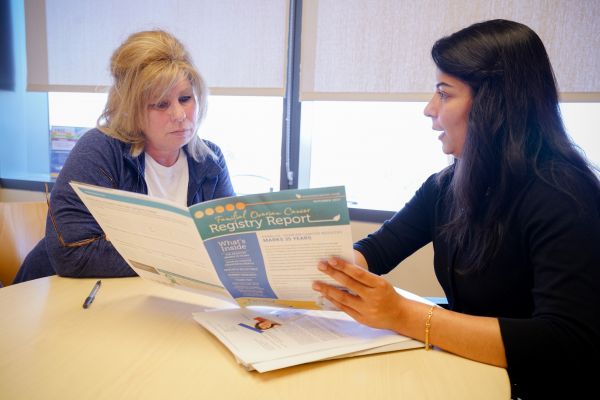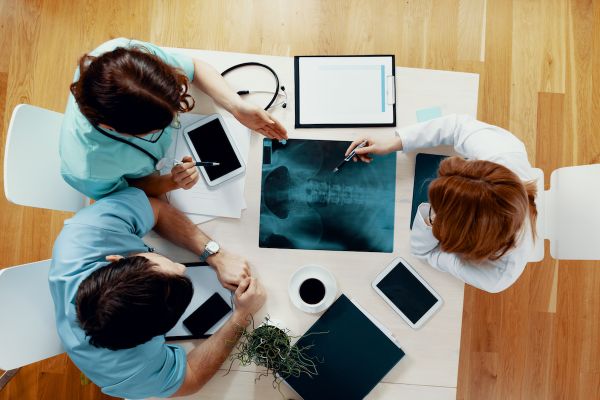Riding her bike across the state to raise funds for Roswell Park and ovarian cancer awareness is part of her comeback tour
Julie Salazar, age 50, wants to impart some hard-earned wisdom. She wants you to know the warning signs of gynecologic cancers. She wants you to advocate for yourself when it comes to getting expert healthcare. She wants you to know how grateful she is for the treatment she received at Roswell Park Comprehensive Cancer Center and the additional support she received from the National Ovarian Cancer Coalition (NOCC). Finally, she wants you to believe in yourself, in the power of setting goals and experiencing the physical and emotional joy of movement.
To prove her point, a little more than a year after learning she had ovarian and endometrial cancer, and less than two months after having her IV chemotherapy chest port removed, Julie worked her way back from being “totally out of shape and full of steroids and drugs” to pedaling her bike 550+ miles across New York state. This summer, Julie and more than 200 “new friends” rode in the Empire State Ride (ESR) to raise money for cancer research at Roswell Park. Julie raised more than $6,000, and collectively, ESR riders raised more than $1.6 million through this year’s event.
Exercise and distance cycling aren’t new to Julie. She took up cycling years ago, while rehabbing from knee injuries sustained while playing college basketball. At age 24, she sold her car and rode her bike cross country, and three years later she rode across mountainous Colorado.
But over the years, life got busy. “I moved to northern New York. As the years passed, I focused way more attention on my business and less on riding and my health, especially in the winter.” Then, in May 2020, she got a terrifying wake-up call. Shortness of breath and a racing heart sent her to the emergency room. By the time she arrived, her symptoms had stopped, and tests proved inconclusive. But, with “crazy things happening due to COVID,” an alert ER doctor did a chest CT scan and found Julie’s lungs riddled with blood clots. Subsequent tests confirmed that she had ovarian cancer and later, surgery and biopsy results revealed that she also had endometrial cancer.
Throughout her cancer and ESR journeys, Julie shared her experiences and new-found knowledge in blogs, with support groups, and on social media, excerpted below.
Blood clots can be a warning sign
Don’t ignore warning signs. “A few weeks prior to my ER visit, I had unexplained, terrible pain in each leg and then later in each foot, but since it went away each time after a few days, I ignored it, and that was a mistake,” Julie says.
“Blood clots are a symptom of cancer in the abdominal cavity, but they aren't common when speaking of ovarian cancer. But the rare subtype of ovarian cancer I had – epithelial endometrioid ovarian cancer – presented with blood clots that invaded both lung cavities. These cancer cells cause clotting and if not for that symptom they would have kept replicating undetected. Ironically, the presence of blood clots saved me.”
Routine GYN care is essential
“Ovarian cancer is the deadliest gynecologic cancer because only 15% of cases are caught early, when it is most treatable,” Julie says. “Ovarian cancer symptoms can be vague. In 2018, my periods grew more irregular and I had mild bloating. In addition, I experienced more frequent urination and some mild occasional pelvic pain. Don’t take these transitions for granted. I hope that one day there will be an accurate screening test for ovarian cancer, but until then, women must know their bodies and advocate for themselves.
“Don’t neglect your annual GYN appointments. Find a GYN practitioner who will listen to you and provide you with a thorough pelvic exam to help detect any abnormal growth in your reproductive organs.”
Know and reduce your risk factors
“Know your risk factors. If one of your blood relatives has had ovarian cancer or BRCA mutations, you are at higher risk for ovarian cancer,” Julie says. “Being overweight is also a risk factor for many types of cancer, including ovarian cancer. Even if you are healthy and have no history of cancer in your family, you are not immune to cancer.
"My oncologist said I met two major risk factors: I never attempted pregnancy and I was never on birth control. As such, I’d never had a pelvic or trans-vaginal ultrasound until my ovarian cancer diagnosis. In my twenties, a nurse practitioner tried to educate me on using birth control pills to reduce certain types of GYN cancer risk, but because I am a lesbian and was not worried about ever getting pregnant, I ignored her advice.”
Why I chose Roswell Park
“Roswell Park is three and half hours from my home, but research convinced me I needed to go to experts in gynecologic oncology. Studies clearly show that patients whose surgeries for ovarian cancer are performed by gynecologic oncologists have more thorough and accurate debulking and staging surgeries and better survival rates than those whose surgeries are performed by gynecologists who are not specifically trained in oncology.
“By using a special stain in their pathology lab Roswell Park doctors were able to tell from my biopsy the exact subtype of my cancer cells and could then better individualize my treatment.
“I also consented to have the Roswell Park research team take ownership of my surgically removed reproductive organs. These can be used for research, including testing them for the NY-ESO-1 ovarian cancer antigen. This antigen is the future of immunotherapy treatment for recurrent ovarian cancer. Roswell Park is working at great speed to produce a vaccine to help the patient's body fight newly formed cancer cells. Clinical trials are being done there right now. Having access to these clinical trials is another reason I chose to go to Roswell Park.”
What to do before and after an appointment
“When we come to Roswell Park, my wife Libby and I usually go to the beautiful outdoor terrace on the second floor to take in some fresh air, reflect and talk about what I want to discuss at my upcoming appointment. Your provider only has so much time to spend with you, so the more honest, clear and specific you can be, the better. Let them know what you are struggling with, what your symptoms are, and so on.
“If for some reason there is a problem or communication breakdown, you must advocate for yourself. Doctors and staff are human. We all have bad days. If you don’t speak up about what is bothering you or what went wrong during an appointment, problems may not be addressed or improved. Roswell Park has patient advocates who can help resolve issues that you feel are impeding your care.”
Set your sights on a goal
“In July 2020, the night before my second chemotherapy treatment, I read an article about the Empire State Ride for cancer research. It’s a 7-day 550-mile bike ride from NYC to Niagara Falls. Watching the YouTube videos about the ride made me so emotional. I promised myself that once I got through all my chemo treatments and my surgery, I would register for the 2021 ride and get back into shape after surviving cancer.
“In December, when my last CT scan was declared ‘clear,’ I rang the Victory Bell. The next day, I rode for five minutes on a stationary bike in my basement. “I was stiff, but it felt great to be cycling again. An app helped me increase and keep track of my workouts. Bicycle riding is my happy place, and I was committed to training for this ride and making women aware of their GYN cancer risk. For me, this ride was to encourage any cancer survivor that exercise is vital.”
Exercise is healthy for you mentally and physically
“As a massage therapist and health coach, I already knew the value of exercise in improving emotional and physical health. But it took cancer to humble me and make me aware that I wasn't taking care of myself. I let work get in the way of getting on my bike.
“During treatment, I had chemotherapy and surgery, but I started walking whenever I had the energy. It didn’t have to be long distances. It just helped to be in fresh air and moving. “My oncologist agreed that exercise is definitely beneficial for ovarian cancer patients. Being physically fit can help patients withstand the rigors of chemotherapy and surgery.”
Why Roswell Park for ovarian cancer treatment?
Roswell Park made a difference for Julie. Find out what Roswell Park can do for you.
Learn MoreStay vigilant in your care
“Make sure you are telling someone – your GYN provider or counselor, for example – what you are feeling physically or emotionally. My body is so different now than it was before cancer treatment, and I am getting counseling from NOCC as I try to learn how to live in this new body. Roswell Park also has a survivorship clinic and ties to many other cancer advocacy and support groups.”
Memories from the Empire State Ride
The Empire State Ride is a fully supported ride, with services such as meals, water stops, lodging (most riders stay in tents with air mattresses set up and taken down by staffers at each stop), showers and bathrooms, charging stations, bike mechanics, and physical and massage therapists.” At every one of our stops, it was like the circus came to town,” Julie says. “A little village was set up and populated by afternoon, and by the next morning, we were gone and off to the next stop.
“We started in Staten Island, NY and each day we rode anywhere from 65 to 100 miles, along beautiful bike paths and well-maintained roads and trails. This was a very emotional event for all of us, I think,” Julie says. “Yes, we battled headwinds, rain, heat, hills, blisters, fatigue (enhanced by roosters crowing at 3:45 a.m. near one of the campsites) and flat tires. But in the evenings, when riders shared stories of why there were riding – either in honor or in memory of cancer patients, or as survivors themselves – we knew our efforts were worth it.”
And of course, there was the fun stuff too. “Ice cream stops. New friends made every day. Lots of moral support from other riders. You get to spend time with people on a level that is not possible in today’s crazy-busy world,” Julie says.
During the ride, Julie posted videos about the riders’ travels that day, along with information about ovarian cancer. “One night I actually Zoomed into my monthly NOCC support group meeting from my tent. One of the women had just had chemotherapy and seeing me along the ride was inspiring for her. Some days I wore my Roswell Park ESR team jersey and some days I wore my NOCC Team Teal jersey, but every day I was there proving that with patience, determination, excellent care and support, and continuing new research, there is hope for cancer patients and improved cancer outcomes.”
Editor’s Note: Cancer patient outcomes and experiences may vary, even for those with the same type of cancer. An individual patient’s story should not be used as a prediction of how another patient will respond to treatment. Roswell Park is transparent about the survival rates of our patients as compared to national standards, and provides this information, when available, within the cancer type sections of this website.
